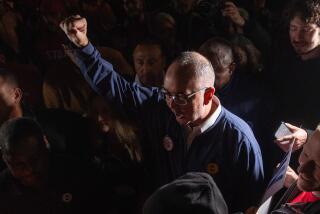U.S. Lesson Will Make Japan More Competitive
- Share via
Japanese companies seldom overlook a chance to win any economic competition with the rest of the world.
Almost everyone knows about their mastery in high technology--Japanese firms have more than half of the world’s computer chip market. Japanese concerns have also bought billions of dollars of real estate in this country, and they continue surging ahead in other big-ticket arenas, ranging from autos and steel to commercial and military aircraft.
And two weeks ago, Japanese Prime Minister Noboru Takeshita flew here to tell President Bush that Japan wants a new, much broader role in international affairs and in managing the world economy.
But one of the latest moves by Japanese officials was in some ways more revealing of their underlying style of dealing with competition. It was on such a small, microcosmic level that few people heard about it.
The move, though, should help Japanese companies become even more competitive, ironically with the assistance of an American union and construction industry officials.
Nine Japanese construction industry and union leaders completed a two-week tour around the United States last Tuesday to learn how we train workers to operate heavy-duty equipment used to move dirt and rock.
What intrigued them was the apprenticeship training programs co-sponsored by U.S. construction industry associations such as the Associated General Contractors and the 360,000-member Operating Engineers Union.
The Japanese visitors went to six of the 70 training centers scattered around the country where about 6,000 apprentices are learning how to use machinery such as bulldozers, graders, cranes, backhoes and scrapers.
The officials said, after a stop at a training center in Whittier, that they came here because they believed that their programs to train operators are terribly inadequate compared to programs in the United States.
Officials of Yamazaki Construction Co. and Kensetsu Domei, the union that represents its employees, were obviously impressed. Haira Matsumoto, head of Yamazaki’s training program, was not subtle and apparently quite sincere:
“Your apprenticeship training is much more extensive and stricter than ours, your standards and discipline are stronger and your operators work harder than those in Japan.
“If I had a choice, I would hire the American operating engineers instead of the Japanese,” said the official of Yamazaki, one of the world’s largest dirt-moving companies.
These were unexpected compliments, coming at a time Japanese executives are supposed to be teaching Americans how to organize factories to get more work out of workers.
Hikaru Ushida, a Kensetsu Domei officer, said America’s Operating Engineers Union “has been able to obtain better wages and conditions than we have for our members, and the American operators are usually much more efficient that our own.”
Workers who want jobs as heavy equipment operators at Yamazaki and most other Japanese construction companies have relatively little trouble getting them, the visitors said. Their operators do not earn much compared to other skilled workers there, and the jobs are not considered as desirable as they are in America.
Operators in Japan earn about 50% to 60% of the $40,000 to $50,000 a year paid to full-time union journeymen operators in the United States.
Japanese operators spend only nine months learning to handle the equipment--usually just one kind--and they must learn mostly on their own. Supervisors or experienced operators are on hand whenever a worker needs help, but there is little formal training.
In America, the union-industry apprentice training takes about four years, including both classroom instruction and on-the-job training under constant supervision.
It is much more difficult to become an operating engineer’s apprentice here than to get an operator’s job in Japan.
Only one of 10 applicants for the programs here are accepted. To put that in perspective, one of five applicants gets into UC Berkeley.
Helping the Japanese match the efficiency of American operators is a decent thing to do and gives the Americans a nice ego boost after the competitive battering the Japanese have inflicted on many American workers and companies.
But showing them how the American construction industry and union train heavy equipment operators isn’t entirely altruistic.
Reese Hammond, the union’s national training director, said after the Japanese left: “We expect Yamazaki and other Japanese construction companies to start doing business here in the next couple of years.
“We think we have established a good relationship with the Yamazaki people, and the word will spread. They now know firsthand what we can do, and they should realize they can work cooperatively and effectively under a union contract if they move into this country.”
Hammond may be right. The tour he helped arrange might mean that Yamazaki and other Japanese construction firms will be more likely to hire unionized American operating engineers when they take on projects here.
But the profits will go back to Japan, further strengthening that nation’s competitive position. And if the Japanese decide to set up their own training system, they might even decide to try to keep the union out, as more and more American construction companies are doing.
Whatever their view of American unions, however, the Japanese officials’ visit to learn how we teach workers to move dirt and rock shows once more that the Japanese don’t miss many chances to stay on top in this competitive world.
More to Read
Sign up for Essential California
The most important California stories and recommendations in your inbox every morning.
You may occasionally receive promotional content from the Los Angeles Times.













